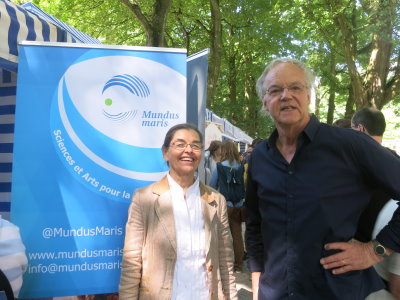 Il nostro Oceano, il nostro futuro - il motto di quest'anno della Giornata Mondiale degli Oceani ha ispirato lo stand di Mundus maris presso il festival ambientale nel Parco del Cinquantenario di Bruxelles, in Belgio, il 4 giugno. Questo è stato anche l'inizio di una serie di eventi e attività organizzate da Mundus maris e dai suoi partner in diversi paesi dell'Africa, Europa e America Latina.
Il nostro Oceano, il nostro futuro - il motto di quest'anno della Giornata Mondiale degli Oceani ha ispirato lo stand di Mundus maris presso il festival ambientale nel Parco del Cinquantenario di Bruxelles, in Belgio, il 4 giugno. Questo è stato anche l'inizio di una serie di eventi e attività organizzate da Mundus maris e dai suoi partner in diversi paesi dell'Africa, Europa e America Latina.
I temi principali dei colloqui erano la pesca eccessiva, l'inquinamento e il cambiamento climatico e, soprattutto, quello che possiamo fare insieme per un futuro migliore.
1. Overfishing
Overfishing is probably still the number one threat to the ocean and its ecosystems. A recent study - the most comprehensive ever carried out about the state of populations in European waters covering 397 stocks - demonstrated that fully 85 percent of stocks of fish and seafood in European waters are currently below healthy levels. But the study also showed that, if managed to recover, fisheries could harvest 57 percent or five million tons more on a sustainable basis! We covered the story earlier - click here for more.
The picture is particularly bleak in the Mediterranean, where fish populations are so depleted that they can not produce anywhere near the high and sustainable catches mandated by the reformed European Common Fisheries Policy (CFP). Urgent protection and reduced fishing mortality are essential to allow recovery. The good news is that it is possible to achieve, as we heard during a recent hearing in the Fisheries Committee in the European Parliament.
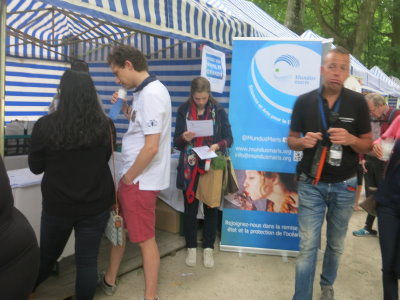 In other parts of the world there are also some signs that recovery is taking place, but incomplete reporting of governments to the Food and Agriculture Organization of the UN (FAO) makes it difficult even for people working in the sector to have a realistic picture. This notwithstanding, shrinking sizes of catches and the size of fish in many of these catches and poor economic health of many fishing operations are indicators of the urgent need to reform. A particularly nasty issue is the still very high level of illegal, unreported and unregulated fishing (IUU fishing), particularly in developing country waters, e.g. off West Africa. In our recent presentation at the EGU Conference, we argued that these are criminal practices of internationally operating syndicates must not be understood and tackled as ordinary fisheries management. Indeed, they have become the focus of a new line of work of Interpol. We also strongly argue for hitting the fraudsters where it hurts, particularly in denying them access to the rich markets in Europe and other wealthy countries and regions to prevent them from realising their illicit profits. Boosting monitoring, control, surveillance and law enforcement in developing countries would be another pillar to curb the criminal practices. That would be a lucrative investment for countries strapped of resources to finance development efforts.
In other parts of the world there are also some signs that recovery is taking place, but incomplete reporting of governments to the Food and Agriculture Organization of the UN (FAO) makes it difficult even for people working in the sector to have a realistic picture. This notwithstanding, shrinking sizes of catches and the size of fish in many of these catches and poor economic health of many fishing operations are indicators of the urgent need to reform. A particularly nasty issue is the still very high level of illegal, unreported and unregulated fishing (IUU fishing), particularly in developing country waters, e.g. off West Africa. In our recent presentation at the EGU Conference, we argued that these are criminal practices of internationally operating syndicates must not be understood and tackled as ordinary fisheries management. Indeed, they have become the focus of a new line of work of Interpol. We also strongly argue for hitting the fraudsters where it hurts, particularly in denying them access to the rich markets in Europe and other wealthy countries and regions to prevent them from realising their illicit profits. Boosting monitoring, control, surveillance and law enforcement in developing countries would be another pillar to curb the criminal practices. That would be a lucrative investment for countries strapped of resources to finance development efforts.
We also showed some means and ways in which citizens can take action beyond active participation in parliamentary elections and other forms of representative democracy. Our pedagogical tools, such as fish rulers for different parts of Europe and the world attracted considerable interest. We could also point to seafood advisories for responsible consumption. We had to caution, however, against bad labelling of the Marine Stewardship Council (MSC) in still about 40 to 50 percent of the cases, where they grant the label to fisheries not meeting the sustainability criteria. Here we argue they need to clear up their act not to abuse consumers' trust and confer unfair commercial advantage on companies not playing by the rules.
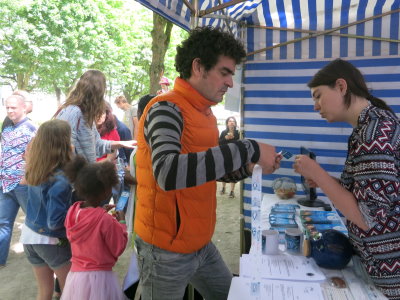 The take home message is: yes, it is possible to fight overfishing and criminal practices in fisheries. Research is producing independent assessments. Citizens, governments and companies can use these for turning the tide. And yes, citizens can contribute significantly to turning the situation around through political engagement, attentive consumption and helping to reduce waste in all its forms. Public institutions and companies have a particular responsibility to enforce and apply existing legislation and not placing further obstacles in the way of the new anti-subsidy discipline nearing adoption in the World Trade Organization (WTO). The local affects the global and vice-versa. So it's worth engaging also at individual level.
The take home message is: yes, it is possible to fight overfishing and criminal practices in fisheries. Research is producing independent assessments. Citizens, governments and companies can use these for turning the tide. And yes, citizens can contribute significantly to turning the situation around through political engagement, attentive consumption and helping to reduce waste in all its forms. Public institutions and companies have a particular responsibility to enforce and apply existing legislation and not placing further obstacles in the way of the new anti-subsidy discipline nearing adoption in the World Trade Organization (WTO). The local affects the global and vice-versa. So it's worth engaging also at individual level.
2. Pollution
The most serious threat to ocean health in this field is widespread overfertilisation of semi-enclosed seas from agricultural run-off and untreated urban waste waters, which create vast dead zones. These appear e.g. in the Baltic and the Black Sea because freshwater highly loaded with nitrates and phosphates from excess fertilisation provoke algae blooms in the sea. During blooms the grazers of algae can not keep up. Thus, the dead bodies of many algae sink to the bottom where they are digested by bacteria and fungi consuming all available oxygen in the process. When oxygen is in short supply only specialised micro-organisms e.g. those living on sulphur or methane as an energy source can survive. Fish and other mobile animals will move out of the area, if they can. Such areas are called dead zones because of their life threatening conditions.
The type of pollution most in the public eye is, of course, plastic pollution. We have reported regularly about it since 2012 and the powerful images of plastic bottles choking rivers particularly in Asia and plastic bag suffocating endangered turtles have captured many people's imagination. Many visitors at the stand confirmed they already reduced or abandoned use particularly of one-way plastic bags and sought other means and ways to prevent more plastic getting into the ocean.
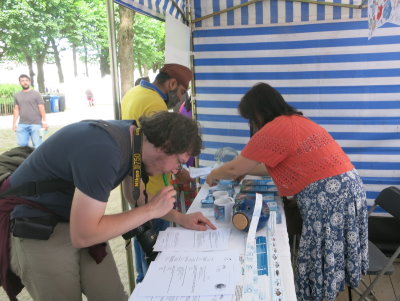 Take home message: Doing something about plastic pollution of beaches, helping in clean-ups, and also taking practical steps of reducing one's own CO2 emissions for climate protection was a recurrent part of the conversations and the pledges several visitors wrote down as a firm commitment towards the ocean. Yes we can, but a really big effort is required to change our ways. Some on-going changes to agricultural practices and efforts by citizens as well as companies hearing the message of reduced and changing packaging point in the right direction. Time to scale up a lot!
Take home message: Doing something about plastic pollution of beaches, helping in clean-ups, and also taking practical steps of reducing one's own CO2 emissions for climate protection was a recurrent part of the conversations and the pledges several visitors wrote down as a firm commitment towards the ocean. Yes we can, but a really big effort is required to change our ways. Some on-going changes to agricultural practices and efforts by citizens as well as companies hearing the message of reduced and changing packaging point in the right direction. Time to scale up a lot!
3. Climate change
This mega challenge was very present in people's mind at the festival. Many visitors at our stand had heard about wide-spread coral bleaching and even death as a result of warming of surface waters of the ocean. We have repeatedly reported in our social media on the particularly serious threats to the Great Barrier Reef off Australia, but also other parts of the tropical seas.
What many people are not so aware of so far is that beyond sealevel rise from warming seas - tough enough as a pervasive, measurable effect - the oxygen level of warmer waters is much less than in cooler waters. We already observe that bigger fish in need of well oxygenated waters are avoiding warmer seas as a result. The combined effect of warmer water and less oxygen in the ocean already leads to a poleward movement of many mobile marine animals seeking to stay within their preferred environmental conditions. Sometimes it won't work, because they need shallow water and cannot live in deeper, cooler waters or they may hit against a continental land mass and are trapped... These are just a couple of reasons, why ecologists expect huge biodiversity losses as a result of climate change (see also the inspirational text of this year's youth contest for Mundus maris Awards).
Another, still undervalued effect of climate change is ocean acidification. It occurs because the ocean has already taken up a lot of the CO2 emissions provoked by human activities. Otherwise warming would even be more pronounced than it already is. CO2 in water is a light acid. It lowers the pH of seawater to a point where organisms with calcareous skeletons need to spend more energy to keep alive and growing.
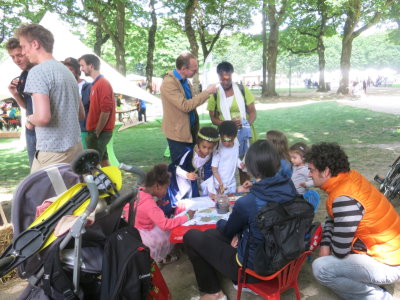 On-site experiments and observations in the ocean have allowed to establish a tentative timeline of reduced growth and decline of different marine organisms with calcareous skeletons if acidification continues unabated. Not a reassuring perspective. Perhaps most worrying is the threat to marine algae which produce the oxygen of every second breath we take.
On-site experiments and observations in the ocean have allowed to establish a tentative timeline of reduced growth and decline of different marine organisms with calcareous skeletons if acidification continues unabated. Not a reassuring perspective. Perhaps most worrying is the threat to marine algae which produce the oxygen of every second breath we take.
Take home message: Awareness was reasonably high, not the least because many aspects of the climate debate were broadly addressed in the mainstream media. The interest to learn more is high, especially on lesser known effects on the ocean. Expand pledging for the ocean by stopping use of plastic bags, reduce plastic bottles and other plastic and make adjustments to daily life that reduce green house gas emissions.
Engage in political life to get the big hitters to comply with the Paris Agenda limiting climate change to less than 2° C warming: these are agriculture, individual traffic (thus primarily the automotive industry and changing to more collective or emission-free movement), heating / cooling of buildings, Last but not least get maritime shipping, responsible for fully six percent of global emissions, to reduce its footprint drastically.
Good interactions
Throughout the day, the Mundus maris team of members and volunteers had good interactions with visitors. Many participated in the ocean quiz and the winner was only announced at 18h because demand for participation did not stop earlier. A number of people also made pledges for the ocean and some wanted to contribute specifically to ocean awareness and protection with suggestions we are happy to follow-up.
The untiring enthusiasm of the kids for splashing water colours on the Mundus maris mascots, Samba and Kumba, gave some breathing space to parents and produced some truly colourful decoration for the stand. Young ocean-lovers come forward to enjoy its beauty still tomorrow.
Check here the winners of the Mundus maris Awards of this year. Congratulations to the winners and all participants as well as to all teachers, supporters and the international jury who all have been contributing to make the youth contest again a great success.
Photos are by CE Nauen unless indicated otherwise.












